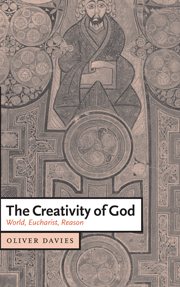Book contents
- Frontmatter
- Contents
- Acknowledgements
- Introduction: the cosmological imperative
- Part I An archaeology of createdness
- Part II Scriptural cosmology
- Part III Eucharistic wisdom
- 7 The abundant real
- 8 Wisdom of the flesh
- 9 Eucharistic reasoning
- Conclusion: cosmology and the theological imagination
- Select bibliography
- Index of biblical citations
- General index
9 - Eucharistic reasoning
Published online by Cambridge University Press: 10 December 2009
- Frontmatter
- Contents
- Acknowledgements
- Introduction: the cosmological imperative
- Part I An archaeology of createdness
- Part II Scriptural cosmology
- Part III Eucharistic wisdom
- 7 The abundant real
- 8 Wisdom of the flesh
- 9 Eucharistic reasoning
- Conclusion: cosmology and the theological imagination
- Select bibliography
- Index of biblical citations
- General index
Summary
L'acte de penser ne découle pas d'une simple possibilité naturelle. Il est, au contraire, la seule creation veritable. La creation, c'est la genèse de l'acte de penser dans la pensée elle-même … Penser, c'est toujours interpreter, c'est-à-dire expliquer, déveloper, déchiffrer, traduire une signe. Traduire, déchiffrer, développer sont la forme de la création pure.
The act of thinking does not proceed from a simple natural possibility; on the contrary, it is the only true creation. Creation is the genesis of the act of thinking within thought itself. To think is always to interpret – to explicate, to develop, to decipher, to translate a sign. Translating, deciphering, developing are the form of pure creation.
Gilles Deleuze, Proust et SignesIn the first section of this book we saw that reason itself in the pre-modern world was understood to be an integral part of the world as created. The detaching of reason from its matrix in a creation-centred cosmology itself played a crucial role in the evolution of the modern, and has become a condition of modern living. Theology has struggled to realise its potential from within the parameters laid down by secular reason. It is only with the rise of Barthianism and its aftermath that alternatives arose, which wrested theology away from secular reason by denying its purchase in thinking ordered to the divine freedom.
- Type
- Chapter
- Information
- The Creativity of GodWorld, Eucharist, Reason, pp. 170 - 191Publisher: Cambridge University PressPrint publication year: 2004

